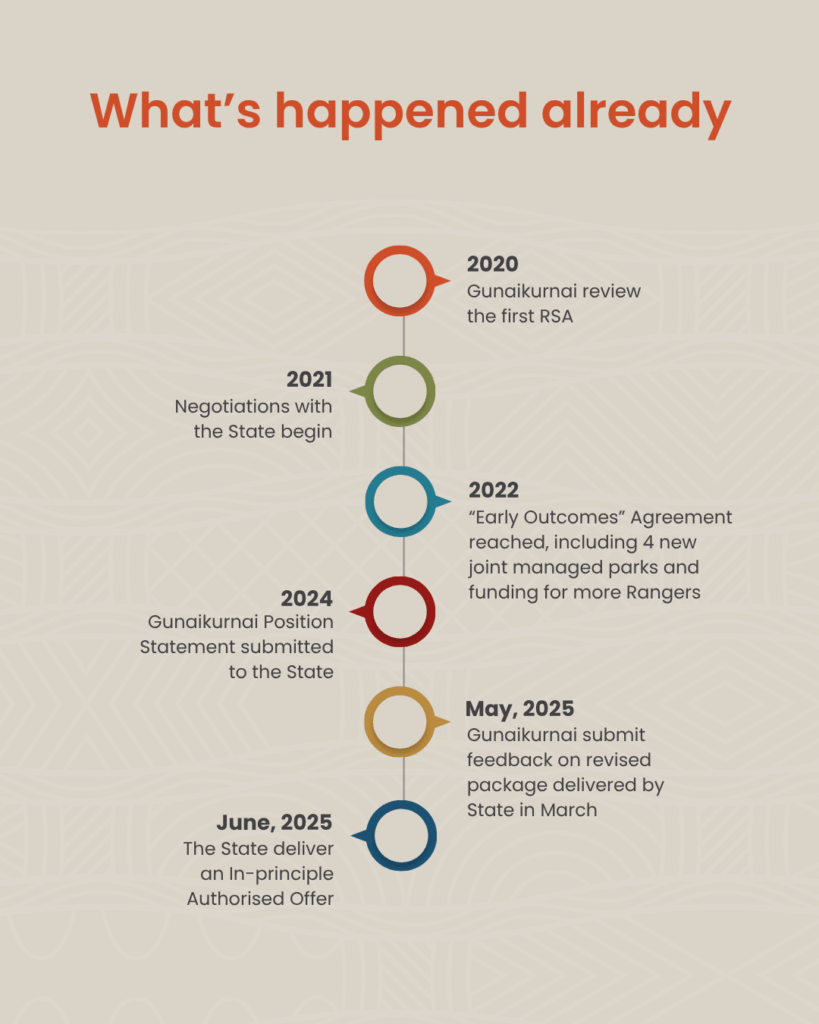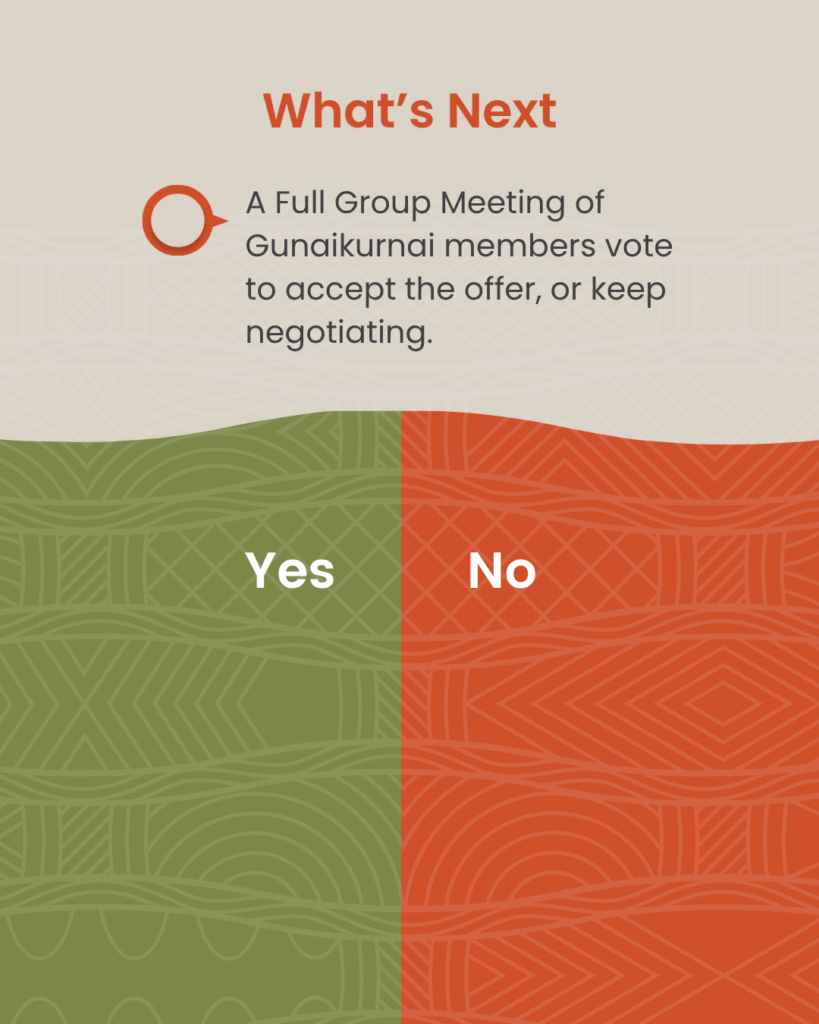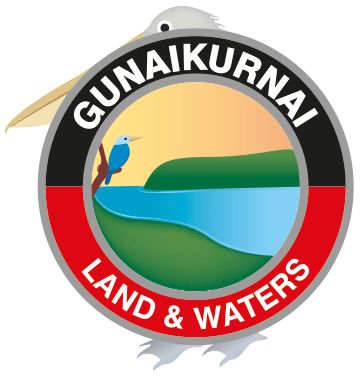Recognition Settlement Agreement
In 2010, we signed a Recognition and Settlement Agreement (RSA) with the Victorian Government. It was the first of its kind in Victoria – and it set strong foundations for our rights, Country, and future. Now, we’re renegotiating the RSA to make sure it delivers more for you members.
This page explains what the agreement means for you, and how you can use your voice to help shape what comes next.
The Recognition and Settlement Agreement (RSA) is a formal agreement between the Gunaikurnai people and the Victorian Government, first signed in 2010.
It’s the foundation for how we care for Country, strengthen culture, and shape our self-determined future.
The original agreement:
>> Recognises us as the Traditional Owners of much of Gippsland;
>> Transferred Aboriginal title to ten national parks and reserves to be jointly managed with the State;
>> Protects our rights to be on Country and practice culture;
>> Backs our future with funding to support cultural and economic opportunities for our community.
Renegotiating the RSA
The Gunaikurnai Negotiating Team – Aunty Lena Morris, Aunty Glenys Watts, Aunty Julie Mongta, Uncle Lloyd Hood, Grattan Mullett, Patrick Mullett and Troy McDonald – was elected by members to deal with the Government. They’ve been working to build on the Agreement put in place in 2010, after many years of hard work by our Elders.
It’s not about starting out again – it’s about adding to what we have, making it better and getting better outcomes for our members, and our future generations.
What we’ve already achieved.
In 2022, the Gunaikurnai Negotiating Team met with the State across nine formal sessions and secured a strong Early Outcomes Agreement. These outcomes laid the foundation for the full package now on the table.
Early wins include:
> Four new joint managed parks
>> Freehold title of two properties in East Gippsland
>>> Funding to support Joint Management and the Gunaikurnai TOLMB
The outcomes are locked in, and as deadly as they are, our work isn’t over yet.
The full Authorised Offer goes further so now it’s time for members to come together to hear what’s on the table have your say whether to say accept it or reject it.
Why your voice matters.
The offer reflects five years of agreement-making by the Gunaikurnai Negotiating Team you elected to speak on your behalf. But the deal can’t go ahead without members agreeing to it so it’s important that you know what’s it’s all about and the benefits it will bring.
Your Rights, Your Voice
Now is your time to ask questions, share your views and prepare for the Full Group vote.
Come along to a cuppa & yarn
Want to talk through it face to face? We’ve got yarns happening all over Country so members can talk about what’s on offer. No need to register, drop in to any of the below between noon and 1pm to learn more.
Morwell Drop-in
Morwell Drop-in
Kalimna West Drop-in
Sale Drop-in
Bairnsdale Drop-in
Join a Wednesday webinar
Can’t make it in person? We’re hosting 1-hour zoom sessions so you can jump online from wherever you are to find out more.
Why has it taken this long to finalise the RSA renegotiation?
A combination of different things. GLaWAC’s period of special administration in 2015 meant that the renegotiations started late. The renegotiations were then delayed by factors such as the State election in 2022 (although not before the 2022 Early Outcomes Agreement was achieved). The negotiations are complex and involve many different parts of the state bureaucracy – which can slow things down.
Who was on the negotiating team, and how were they chosen?
The negotiating team has been in place since 2019 and was formed through an expression of interest. They are Aunty Glenys Watts, Aunty Lena Morris, Aunty Julie Mongta, Uncle Lloyd Hood, Troy McDonald, Grattan Mullett and Patrick Mullett.
Can members suggest changes to the offer?
The offer is based on the 2008 Statement of Aspirations and have been negotiated on your behalf by the Gunaikurnai negotiating team. The upcoming vote at the Full Group Meeting will be to accept or reject the offer as is, no further changes will be allowed
Why can’t we negotiate further now that we’ve seen the offer?
The hard work of the negotiation team has led to this point, and so the decision is about the offer on the table now. But the RSA is a living agreement and can be renegotiated again when the Gunaikurnai are ready.
What happens if we say no?
The State may withdraw the offer and the opportunities to achieve outcomes now will be further delayed. There is also a State election in November 2026 – and we don’t know what a future government might offer.
If we vote yes, can we still negotiate other things later (e.g. water, land)?
Yes, there are several different ways to negotiate change including through future RSA negotiations, Native Title, Treaty and GLaWAC’s own Pathways to Partnership policy.
What if I don’t understand the RSA language, is there a plain-English version?
The RSA is a complex legal document. It can be confusing even for experts. GLaWAC will be hosting numerous drop-in sessions and online sessions so that everyone can learn and ask questions.
Are there financial payments in the RSA? How much?
The RSA includes a funding agreement. You can learn more about what’s on offer by attending a drop-in session. Some of the proposed funding is locked to projects or purposes. Other funding can be placed into the Gunaikurnai trust established in 2010 or used to support GLaWAC’s strategic projects for the Gunaikurnai community.
Will the full offer be shared with members before the vote?
The RSA authorised offer is a sensitive legal document, but there will be plenty of information available and time to discuss before the final vote.
What’s the process for the RSA vote? Who can vote?
GLaWAC will coordinate a full group meeting to vote on the final authorised offer. There will be more information about this process when notification of the meeting is sent out.
Are we giving up any rights if we vote yes?
Part of the offer includes a Land Use Activity Agreement (LUAA), which will replace the Future Act’s regime of the Native Title Act 1993. The LUAA and the Future Act’s regime help protect Gunaikurnai rights and interests when activities occur on Country. For example, mining, or building or repairing public infrastructure like jetties or power lines. Right now the Future Acts regime applies
There are pros and cons to both options, and they are very complex. Right now, neither one is clearly better than the other.
There will be more information about these options in the drop-in sessions, and there is no rush to decide on a LUAA. If more time is required to properly understand the pros and cons, then switching to a LUAA can be part of the next round of RSA negotiations.
Can the State change the agreement later?
The RSA is a living document and can be renegotiated (roughly every five years). The State can seek to make changes, but they must negotiate with the Gunaikurnai community and GLaWAC first.
What protections are in place to make sure our rights are respected?
The RSA works alongside Native Title to protect Gunaikurnai rights and interests. It can’t be changed by the State without agreement from the Gunaikurnai community.
What’s the difference between Native Title and an RSA?
Native title is the recognition in Australian law that some Indigenous people continue to hold rights to their lands and waters that come from their traditional laws and customs.
An RSA is an agreement between the Victorian Government and Traditional Owners to recognise their relationship to land and provide for certain rights on Crown land and other benefits.
An RSA can be an alternative to Native Title, but some Traditional Owners, such as the Gunaikurnai, have both.






